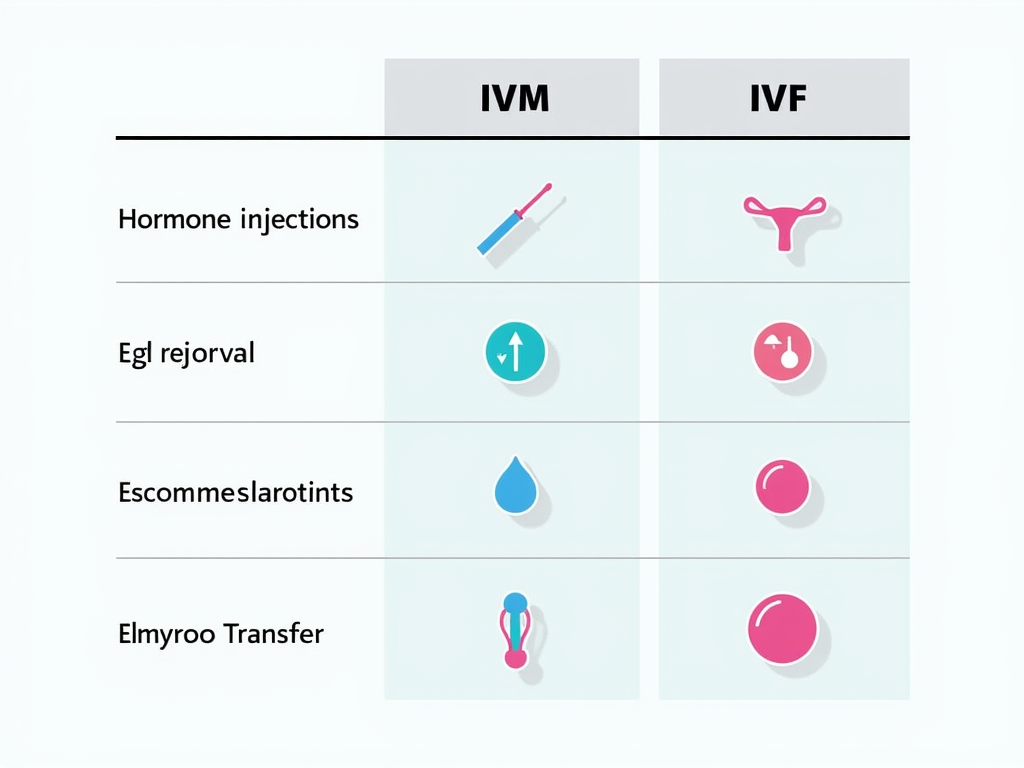In Vitro Maturation: A Less Invasive Fertility Treatment
April 27, 2025, 7:45 a.m.
In Vitro Maturation (IVM) is a less invasive fertility treatment that offers hope to women struggling with infertility, especially those with PCOS. By maturing eggs in a laboratory instead of inside the body, IVM reduces the need for hormone stimulation and lowers the risk of complications.
Understanding In Vitro Maturation (IVM)
IVM is a fertility treatment where doctors collect immature eggs from your ovaries and mature them in a lab before fertilizing them with sperm. Unlike In Vitro Fertilization (IVF), which uses lots of hormone shots to mature eggs inside your body, IVM keeps things simpler. The American Society for Reproductive Medicine says it’s a great option for women with polycystic ovary syndrome (PCOS) or those worried about ovarian hyperstimulation syndrome (OHSS), a risky side effect of IVF.
The IVM Process
Here’s how IVM works:
- Ovarian stimulation: You might get a few days of mild hormone shots—or none at all.
- Egg retrieval: Doctors use a thin needle to collect immature eggs.
- Egg maturation: The eggs mature in a lab dish.
- Fertilization: Sperm is injected into the mature eggs.
- Embryo transfer: Embryos go back into your uterus.

Comparing IVM and IVF
Both IVM and IVF help you have a baby, but they’re different:
- Hormone shots: IVF needs many; IVM uses few or none.
- Eggs collected: IVF takes mature eggs; IVM takes immature ones.
- OHSS risk: IVM is safer.
- Success rates: IVF often works better, but IVM is catching up.

Benefits of IVM
IVM has some big pluses:
- Less chance of OHSS, a serious IVF risk.
- Fewer shots and doctor visits.
- Often costs less than IVF.
- Takes less time from start to finish.
Challenges and Limitations of IVM
IVM isn’t perfect:
- Success rates are usually lower than IVF.
- Not every clinic offers it.
- It doesn’t work for everyone, so you need the right fit.
Who is a Good Candidate for IVM?
IVM might be right for you if:
- You have PCOS or a high OHSS risk.
- Hormone shots didn’t work well before.
- You want a gentler treatment.
It’s less ideal if you’re older or have certain health issues.
Personal Insights and Experiences
I’ve been through fertility treatments myself, and it’s tough—physically and emotionally. When I heard about IVM, I was curious. Fewer shots sounded better than the IVF rollercoaster. I tried IVM after talking to my doctor. It was easier on my body, even though I didn’t get pregnant that time. I’d do it again for the peace it brought.
Understanding PCOS and Fertility Challenges
PCOS affects about 1 in 10 women and messes with your hormones, making periods irregular and ovulation rare. That makes getting pregnant hard. IVF can help, but it’s risky for PCOS patients because of OHSS. IVM steps in as a safer choice by skipping heavy hormone use.

Benefits of In Vitro Maturation for Fertility
IVM shines with these perks:
- Safety: Cuts OHSS risk.
- Comfort: Less stress on your body and mind.
- Cost: Can save you money.
- Speed: Gets you through treatment faster.
The Emotional Benefits of IVM
Fertility journeys wear you out with hope and letdowns. IVM’s lighter approach—fewer shots, shorter waits—eases that load. You feel less like a science experiment and more like yourself.
Cost Comparison: IVM vs. IVF
IVM often costs less than IVF. Resolve: The National Infertility Association says IVF runs $12,000-$15,000 per cycle, plus $3,000-$5,000 for meds. IVM might be $8,000-$10,000 total. But if it takes more tries, costs could even out.
The Future of IVM
IVM is getting better. New lab techniques are boosting success rates. Some clinics now freeze eggs with IVM, opening doors for cancer patients or others needing quick options. It’s an exciting time for this treatment.
In summary, In Vitro Maturation offers a gentler path to parenthood, especially for women with PCOS. It’s not as well-known as IVF, but its safety and simplicity make it worth considering. Talk to your doctor to see if it fits your story.